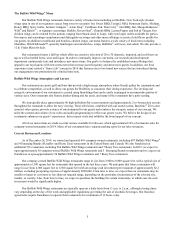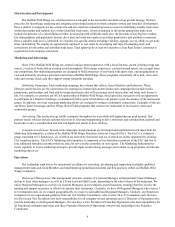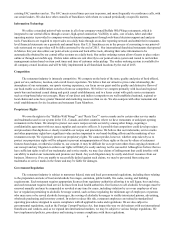Buffalo Wild Wings 2014 Annual Report Download - page 15
Download and view the complete annual report
Please find page 15 of the 2014 Buffalo Wild Wings annual report below. You can navigate through the pages in the report by either clicking on the pages listed below, or by using the keyword search tool below to find specific information within the annual report.14
and its effect on overall consumer perceptions of food safety, or our failure to respond effectively to adverse publicity, could
have a material adverse effect on our business.
Changes in employment laws or regulation could harm our performance.
Various federal and state labor laws govern our relationship with our employees and affect operating costs. These laws
include minimum wage requirements, overtime pay, healthcare reform and the implementation of the Patient Protection and
Affordable Care Act, unemployment tax rates, workers’ compensation rates, citizenship requirements, union membership, and
sales taxes. A number of factors could adversely affect our operating results, including additional government-imposed
increases in minimum wages, overtime pay, paid leaves of absence and mandated health benefits, mandated training for
employees, increased tax reporting and tax payment requirements for employees who receive tips, a reduction in the number of
states that allow tips to be credited toward minimum wage requirements, changing regulations from the National Labor
Relations Board and increased employee litigation including claims relating to the Fair Labor Standards Act.
The Americans with Disabilities Act is a federal law that prohibits discrimination on the basis of disability in public
accommodations and employment. Although our restaurants are designed to be accessible to the disabled, we could be required
to make modifications to our restaurants to provide service to, or make reasonable accommodations for disabled persons.
Failure of our internal controls over financial reporting could harm our business and financial results.
Our management is responsible for establishing and maintaining effective internal control over financial reporting.
Internal control over financial reporting is a process to provide reasonable assurance regarding the reliability of financial
reporting for external purposes in accordance with accounting principles generally accepted in the United States. Because of its
inherent limitations, internal control over financial reporting is not intended to provide absolute assurance that we would
prevent or detect a misstatement of our financial statements or fraud. Any failure to maintain an effective system of internal
control over financial reporting could limit our ability to report our financial results accurately and timely or to detect and
prevent fraud. A significant financial reporting failure or material weakness in internal control over financial reporting could
cause a loss of investor confidence and decline in the market price of our stock.
Economic conditions could have a material adverse impact on our landlords or other tenants in retail centers in which
we or our franchisees are located, which in turn could negatively affect our financial results.
Our landlords may be unable to obtain financing or remain in good standing under their existing financing arrangements,
resulting in failures to pay required construction contributions or satisfy other lease covenants to us. In addition other tenants at
retail centers in which we or our franchisees are located or have executed leases may fail to open or may cease operations. If
our landlords fail to satisfy required co-tenancies, such failures may result in us or our franchisees terminating leases or
delaying openings in these locations. Also, decreases in total tenant occupancy in retail centers in which we are located may
affect guest traffic at our restaurants. All of these factors could have a material adverse impact on our operations.
An impairment in the carrying value of our goodwill or other intangible assets could adversely affect our financial
condition and consolidated results of operations.
Goodwill represents the excess of cost over the fair value of identified net assets of business acquired. We review
goodwill for impairment annually, or whenever circumstances change in a way which could indicate that impairment may have
occurred. Goodwill is tested at the reporting unit level. We identify potential goodwill impairments by comparing the fair value
of the reporting unit to its carrying amount, which includes goodwill and other intangible assets. The fair value of the reporting
unit is calculated using a market approach. If the carrying amount of the reporting unit exceeds the fair value, this is an
indication that impairment may exist. We calculate the amount of the impairment by comparing the fair value of the assets and
liabilities to the fair value of the reporting unit. The fair value of the reporting unit in excess of the value of the assets and
liabilities is the implied fair value of the goodwill. If this amount is less than the carrying amount of goodwill, impairment is
recognized for the difference. A significant amount of judgment is involved in determining if an indication of impairment
exists. Factors may include, among others: a significant decline in our expected future cash flows; a sustained, significant
decline in our stock price and market capitalization; a significant adverse change in legal factors or in the business climate;
unanticipated competition; the testing for recoverability of a significant asset group within a reporting unit; and slower growth
rates. Any adverse change in these factors would have a significant impact on the recoverability of these assets and negatively
affect our financial condition and consolidated results of operations. We compute the amount of impairment by comparing the
implied fair value of reporting unit goodwill with the carrying amount of that goodwill. We are required to record a non-cash
impairment charge if the testing performed indicates that goodwill has been impaired.
























